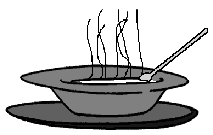
Verbs: Advanced
Verb string:
A verb string is a construction formed by one or more verbs in sequence. Up to four verbs can precede the main verb in a verb string (She could have been being starved). In English, the verb string is the way that variations in time or mood are expressed.
Consider this passage:
I have always thought it essential that all good soups should be made using a good, meaty stock. This a personal view, I should add. If you are making a pea-and-ham soup, after you have boiled a piece of gammon, you would use the liquor that the ham was cooked in. A Scotch broth should be flavoured with lamb.
 |
||
| have always thought | are making |
| should be made | have boiled |
| should add | would use |
| was cooked | should be flavoured |
In each verb string there is only one main verb, which is always the last verb in the string. The first verb in a verb string is always the finite verb. In some books, you will find the verb string referred to as a verb phrase. This can create confusion as other books will tell you that a distinction between a phrase and a clause is that a phrase has no verb! Verb string is the clearest way to describe this sequencing of verbs.
Auxiliary Verb:
Auxiliary verbs are those verbs which precede the main verb and help to create the variations in expression of time and mood. The verbs be, have and do are commonly auxiliary verbs as in verb phrases such as
These three verbs (be, have and do) are called primary verbs because they can act as auxiliaries but also as main verbs. In the sentences below they are main verbs.
Another important category of auxiliary verb is the modal verb (see next subheading).
Modal verbs
The modal verbs express possibility or certainty. There are nine verbs in this group:
can; could, shall; should; may; might; must; will; would
These verbs do not behave like main or primary verbs as they have no non-finite forms (you can't form a present participle - coulding; or a past participle - mayed). Thus they are always finite verbs.



You are currently here: Word Classes > Verbs > Advanced. The next page in this section is Verbs Teaching Implications.